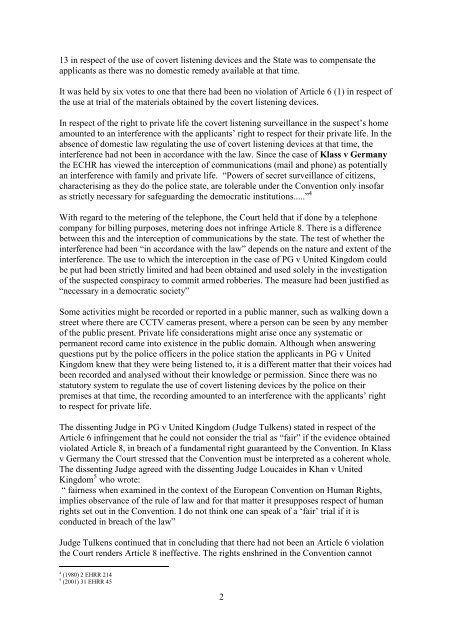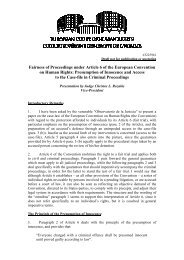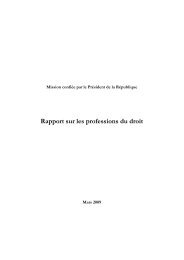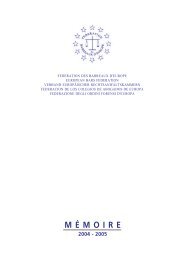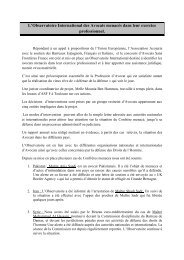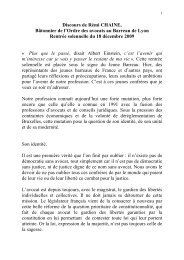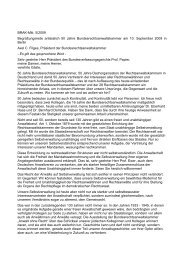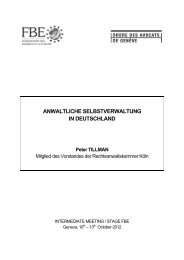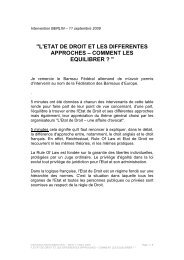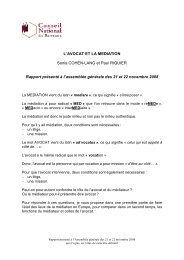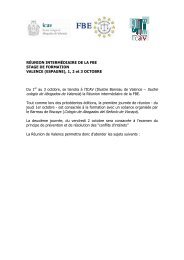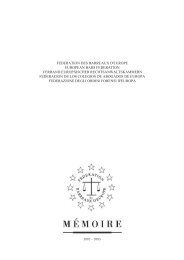Sara Chandler
Sara Chandler
Sara Chandler
You also want an ePaper? Increase the reach of your titles
YUMPU automatically turns print PDFs into web optimized ePapers that Google loves.
13 in respect of the use of covert listening devices and the State was to compensate the<br />
applicants as there was no domestic remedy available at that time.<br />
It was held by six votes to one that there had been no violation of Article 6 (1) in respect of<br />
the use at trial of the materials obtained by the covert listening devices.<br />
In respect of the right to private life the covert listening surveillance in the suspect’s home<br />
amounted to an interference with the applicants’ right to respect for their private life. In the<br />
absence of domestic law regulating the use of covert listening devices at that time, the<br />
interference had not been in accordance with the law. Since the case of Klass v Germany<br />
the ECHR has viewed the interception of communications (mail and phone) as potentially<br />
an interference with family and private life. “Powers of secret surveillance of citizens,<br />
characterising as they do the police state, are tolerable under the Convention only insofar<br />
as strictly necessary for safeguarding the democratic institutions.....” 4<br />
With regard to the metering of the telephone, the Court held that if done by a telephone<br />
company for billing purposes, metering does not infringe Article 8. There is a difference<br />
between this and the interception of communications by the state. The test of whether the<br />
interference had been “in accordance with the law” depends on the nature and extent of the<br />
interference. The use to which the interception in the case of PG v United Kingdom could<br />
be put had been strictly limited and had been obtained and used solely in the investigation<br />
of the suspected conspiracy to commit armed robberies. The measure had been justified as<br />
“necessary in a democratic society”<br />
Some activities might be recorded or reported in a public manner, such as walking down a<br />
street where there are CCTV cameras present, where a person can be seen by any member<br />
of the public present. Private life considerations might arise once any systematic or<br />
permanent record came into existence in the public domain. Although when answering<br />
questions put by the police officers in the police station the applicants in PG v United<br />
Kingdom knew that they were being listened to, it is a different matter that their voices had<br />
been recorded and analysed without their knowledge or permission. Since there was no<br />
statutory system to regulate the use of covert listening devices by the police on their<br />
premises at that time, the recording amounted to an interference with the applicants’ right<br />
to respect for private life.<br />
The dissenting Judge in PG v United Kingdom (Judge Tulkens) stated in respect of the<br />
Article 6 infringement that he could not consider the trial as “fair” if the evidence obtained<br />
violated Article 8, in breach of a fundamental right guaranteed by the Convention. In Klass<br />
v Germany the Court stressed that the Convention must be interpreted as a coherent whole.<br />
The dissenting Judge agreed with the dissenting Judge Loucaides in Khan v United<br />
Kingdom 5 who wrote:<br />
“ fairness when examined in the context of the European Convention on Human Rights,<br />
implies observance of the rule of law and for that matter it presupposes respect of human<br />
rights set out in the Convention. I do not think one can speak of a ‘fair’ trial if it is<br />
conducted in breach of the law”<br />
Judge Tulkens continued that in concluding that there had not been an Article 6 violation<br />
the Court renders Article 8 ineffective. The rights enshrined in the Convention cannot<br />
4 (1980) 2 EHRR 214<br />
5 (2001) 31 EHRR 45<br />
2


